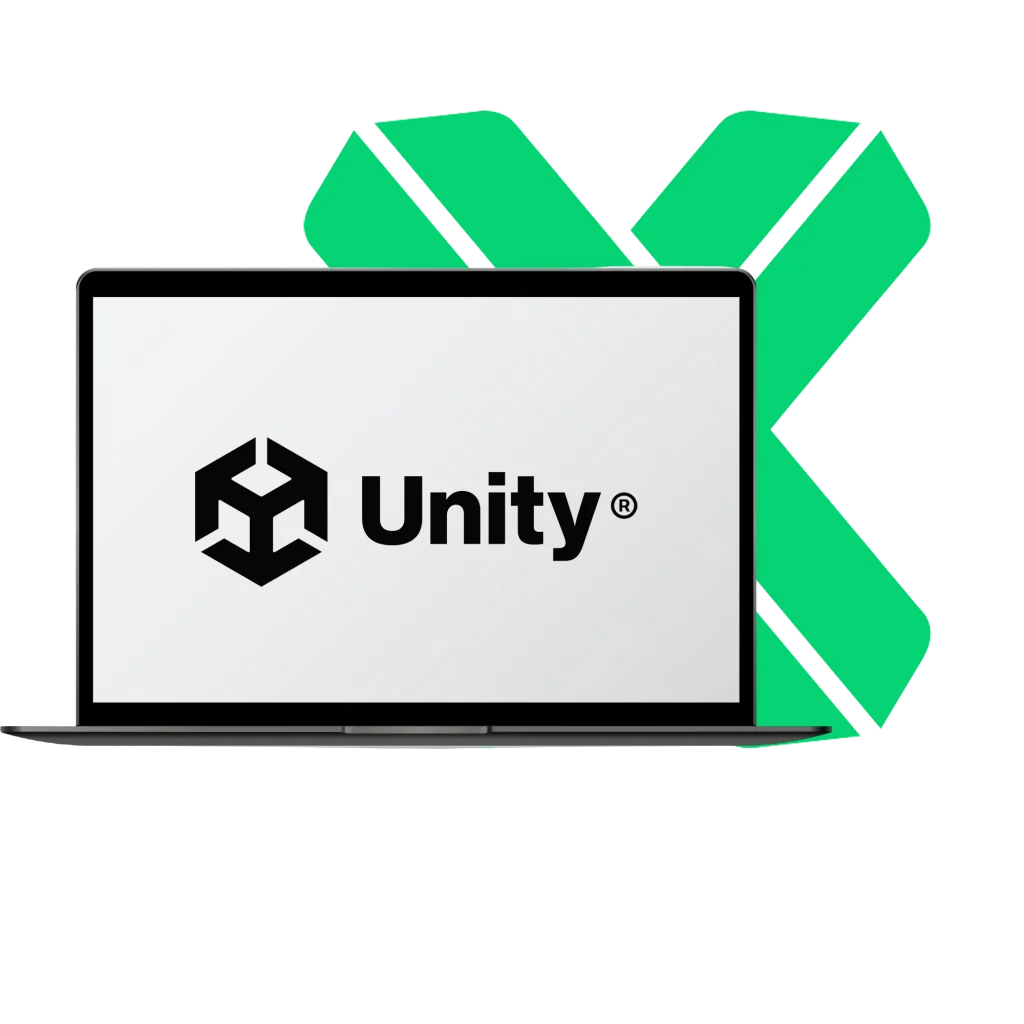UNITY DEVELOPMENT
Build immersive 2D, 3D, and AR/VR experiences with Unity and nearshore talent.
We quickly assemble skilled teams to design and develop 2D, 3D, and AR/VR experiences using Unity’s powerful game engine, ensuring interactive, high-performance solutions for your audience.

+200 companies rely on
our 1% Top Talent

Unity Development Services We Provide
We offer comprehensive Unity development services, from interactive game design to AR/VR solutions and mobile app development. Explore our key offerings below:
Game Development
We create high-performance 2D and 3D games using Unity, focusing on delivering immersive gameplay, stunning visuals, and engaging mechanics. Our Unity developers handle everything from concept to deployment across multiple platforms, including iOS, Android, PC, and consoles.
AR/VR Development
Our team builds cutting-edge AR/VR experiences using Unity, creating interactive environments for gaming, simulations, and business applications. From virtual tours to product visualizations, we ensure high-quality, immersive experiences optimized for VR headsets and mobile AR devices.
Cross-Platform Development
With Unity’s cross-platform capabilities, we develop applications and games that work seamlessly on multiple platforms, including iOS, Android, Windows, macOS, and consoles. This ensures consistent performance and reduces time-to-market for your projects.
Unity Mobile App Development
We leverage Unity’s engine to develop feature-rich mobile applications that include 2D/3D graphics, interactive elements, and gamified experiences. Our mobile apps are optimized for both iOS and Android, ensuring smooth performance across devices.
Interactive 3D Visualization
We build interactive 3D visualizations for industries such as real estate, architecture, and product design. Our Unity developers create visually rich, interactive models that allow users to explore products, spaces, or data in a dynamic, immersive way.
Unity Maintenance and Optimization
We provide ongoing maintenance and performance optimization for your Unity applications. Our team ensures that your games, simulations, or apps remain bug-free, up-to-date, and perform smoothly across all platforms and devices.
Why Choose Xpertsoft for Unity Development
Nearshore Expertise
Our developers are primarily based in Portugal, ensuring smooth collaboration with EU-based clients. With real-time communication and bilingual professionals, we offer efficient Unity development and support services.
Broad Technical Expertise
Beyond Unity, our team brings expertise in AR/VR, mobile app development, 3D modeling, and cross-platform development. We provide end-to-end solutions that ensure your Unity projects are immersive, scalable, and optimized for performance.
Tailored Game and App Solutions
We provide flexible Unity development services that align with your business goals. Whether you need a mobile game, an AR/VR application, or a cross-platform simulation, we customize our solutions to meet your specific needs.
The Unity Ecosystem We Used in Previous Work
Game Development and Animation
Leverage Unity’s tools for building immersive, high-performance games:
- Unity 2D (for building 2D games and applications)
- Unity 3D (for immersive 3D experiences)
- Unity Asset Store (for pre-built assets and resources)
- C# (for scripting and game logic)
- Mecanim (for character animation and movement)
AR/VR Development
Create next-gen AR/VR applications with Unity’s cutting-edge features:
- Unity AR Foundation (for ARKit and ARCore integration)
- Oculus SDK (for building VR experiences)
- Vuforia (for augmented reality applications)
- Unity XR Interaction Toolkit (for building interactive VR environments)
Cross-Platform Deployment
Develop once and deploy across multiple platforms:
- Unity Build Pipeline (for seamless cross-platform deployment)
- Unity Cloud Build (for continuous integration and delivery)
- iOS and Android (for mobile game development)
- PlayStation, Xbox, and Nintendo Switch (for console development)
3D Modeling and Visualization
Design interactive 3D models and environments with Unity’s tools:
- Unity ProBuilder (for 3D modeling and environment creation)
- Blender (for 3D asset creation and integration)
- Unity Lighting Engine (for realistic lighting and shadows)
- Physics Engine (for simulating real-world physics)
Key Facts about Unity Development
- Benefits of using Unity
-
1. Cross-Platform Development with a Single Codebase
Unity enables developers to build applications and games once and deploy them across multiple platforms, including iOS, Android, PC, macOS, and consoles. This cross-platform capability speeds up development and ensures a consistent experience across devices.
2. Immersive 3D and AR/VR Experiences
Unity is the go-to platform for building visually rich, interactive 3D experiences and immersive AR/VR applications. With support for high-quality graphics, real-time rendering, and advanced physics, Unity is perfect for industries ranging from gaming to architecture and education.
3. Extensive Asset Library and Community Support
Unity’s Asset Store provides access to a vast library of pre-built assets, plugins, and resources, which accelerates the development process. The active Unity developer community also ensures that support, tutorials, and tools are readily available.
- Unity is primarily used for
-
Unity is primarily used for developing 2D/3D games, AR/VR applications, and interactive simulations. It is widely adopted for cross-platform mobile games, real-time 3D visualization in industries like real estate, and immersive virtual reality experiences.
- Reasons for Unity’s popularity
-
• Powerful Game Engine: Unity’s powerful game engine provides real-time rendering, dynamic lighting, and realistic physics, enabling developers to create highly interactive and visually stunning applications.
• Ease of Use and Fast Prototyping: Unity offers an intuitive interface and a wide range of pre-built assets, making it easy to prototype and develop applications quickly. This allows businesses to test ideas and bring products to market faster.
• AR/VR Capabilities: Unity’s native support for ARKit, ARCore, and various VR platforms like Oculus and HTC Vive makes it the preferred choice for building immersive augmented and virtual reality applications.
• Support for Multiple Programming Languages: Unity supports scripting in C# and offers flexible development options for developers with different programming backgrounds, making it accessible to a broad audience of developers.
• Realistic 3D Modeling and Physics Simulation: Unity’s physics engine and advanced rendering capabilities allow developers to create realistic simulations, making it ideal for games, educational tools, and industrial training applications.
• Extensive Developer Community: Unity has a large, active developer community, which means developers have access to a wealth of tutorials, plugins, and third-party tools that help streamline the development process.
• Scalable for Enterprise Solutions: Unity is scalable, making it suitable not only for indie game developers but also for enterprises looking to build complex, large-scale applications for training, simulation, and customer engagement.
- Useful Links
-
1. Cross-Platform Development with a Single Codebase
Unity enables developers to build applications and games once and deploy them across multiple platforms, including iOS, Android, PC, macOS, and consoles. This cross-platform capability speeds up development and ensures a consistent experience across devices.
2. Immersive 3D and AR/VR Experiences
Unity is the go-to platform for building visually rich, interactive 3D experiences and immersive AR/VR applications. With support for high-quality graphics, real-time rendering, and advanced physics, Unity is perfect for industries ranging from gaming to architecture and education.
3. Extensive Asset Library and Community Support
Unity’s Asset Store provides access to a vast library of pre-built assets, plugins, and resources, which accelerates the development process. The active Unity developer community also ensures that support, tutorials, and tools are readily available.
Unity is primarily used for developing 2D/3D games, AR/VR applications, and interactive simulations. It is widely adopted for cross-platform mobile games, real-time 3D visualization in industries like real estate, and immersive virtual reality experiences.
• Powerful Game Engine: Unity’s powerful game engine provides real-time rendering, dynamic lighting, and realistic physics, enabling developers to create highly interactive and visually stunning applications.
• Ease of Use and Fast Prototyping: Unity offers an intuitive interface and a wide range of pre-built assets, making it easy to prototype and develop applications quickly. This allows businesses to test ideas and bring products to market faster.
• AR/VR Capabilities: Unity’s native support for ARKit, ARCore, and various VR platforms like Oculus and HTC Vive makes it the preferred choice for building immersive augmented and virtual reality applications.
• Support for Multiple Programming Languages: Unity supports scripting in C# and offers flexible development options for developers with different programming backgrounds, making it accessible to a broad audience of developers.
• Realistic 3D Modeling and Physics Simulation: Unity’s physics engine and advanced rendering capabilities allow developers to create realistic simulations, making it ideal for games, educational tools, and industrial training applications.
• Extensive Developer Community: Unity has a large, active developer community, which means developers have access to a wealth of tutorials, plugins, and third-party tools that help streamline the development process.
• Scalable for Enterprise Solutions: Unity is scalable, making it suitable not only for indie game developers but also for enterprises looking to build complex, large-scale applications for training, simulation, and customer engagement.
Add top 1% devs to
your in-house teams
Tap into the expertise of our top 1% developers. Staff augmentation lets you boost your in-house teams with specialized experts. Expedite timelines without sacrificing output quality.
Here’s how we augment your team

STEP 1
Discovery Call
Share your requirements, budget, and necessary skill sets. We will draft a working timeline and select top developers for your team.
STEP 2
Assembling Your Team
Withindays, we’ll find suitable developers that fit your requirements. We ensure they have the right technical expertise and would be a great cultural fit for your team.
STEP 3
Onboarding and Scaling
After onboarding them, our developers will integrate with your team. Scale your engagement as needed – we’re happy to accommodate your demands.
Get an
entire Team
Looking to bring on more than just a few .NET developers? We’ll assemble a complete crew to support you. Whether it’s full-cycle front and back-end web development, QA, DevOps, UX/UI, or something else. Monitor the team’s performance and manage them as you see fit.
Here’s how you can get a dedicated team

STEP 1
Discovery Call
We’ll learn about your business, organization structure, objectives, budget, timelines, and resource requirements. Then, we can start identifying the ideal talent for you.
STEP 2
Team Assembly and Integration
Once we assemble your dedicated team, we’ll ensure a smooth transition as they integrate with your organization.
STEP 3
Project Kickoff
After onboarding, your team is at your disposal. You’ve now acquired the resources you need without the hassle and high cost that usually comes with recruitment
